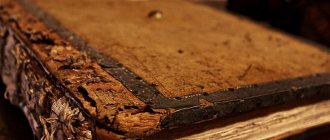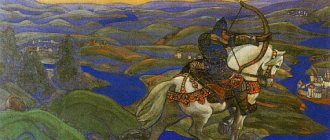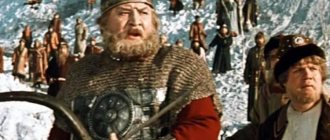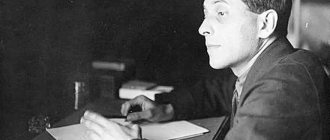About the product
Hemingway's "The Old Man and the Sea" was first published in 1952. The work tells the story of an episode in the life of an old Cuban fisherman who fought on the high seas with a huge marlin, which became his biggest catch in his life. “The Old Man and the Sea” is the last known work published during the writer’s lifetime. The story was awarded the Pulitzer and Nobel Prizes.
On the site you can read online a summary of “The Old Man and the Sea” chapter by chapter, as well as take a test on your knowledge of the story for better preparation for a literature lesson.
The material was prepared jointly with the highest category teacher Lyubov Alexandrovna Koroshchup.
Experience as a teacher of Russian language and literature - 30 years.
List and brief characteristics of the heroes of the story “The Old Man and the Sea”
The main characters of the story “The Old Man and the Sea”:
- Boy Manolin is a village boy from a poor family, whom Santiago teaches fishing, passing on his skills to him. Manolin is a capable student, he has already mastered the business well and brings home a large catch. The boy has a kind heart - he takes care of the old man with tenderness, helping him in caring for the gear and catching sardines for bait. He does not lose faith in the old fisherman, and even when his parents call the old man unlucky and forbid Manolin to fish with Santiago, he supports the old fisherman.
- Old man Santiago is an experienced, lonely Cuban fisherman who lives on an island in a village near the seashore. He's lonely and old, and he admits it. Although his face is lined with wrinkles and there are brown spots of skin cancer on his cheeks and neck, his arms are still as strong as in his youth, his eyes are shining, and his will is unshakable. The old man sailed to Africa as a cabin boy in his youth, but now he doesn’t even have a fishing net - he had to sell it many years ago, and he has to sleep on a bed covered with old newspapers. Previously, he only talked to the boy about fishing, but over time he became attached to him and they became friends.
Summary
The old man was fishing alone in the Gulf Stream. For 84 days he did not catch a single fish. For the first 40 days he had a boy with him. But the boy’s parents, deciding that the old man was now “unlucky,” ordered Manolin to go to sea on another boat - the “lucky” one. “The old man was thin and emaciated, the back of his head was cut by deep wrinkles,” and his cheeks were covered with spots of harmless skin cancer caused by the sun. There were old twine scars on his arms.
One day a boy and an old man were sitting on the terrace and drinking beer. The boy remembered how he caught his first fish at the age of 5 - he remembered everything from the very first day when the old man took him to the sea. Santiago shared that tomorrow he will go to sea before dawn.
The old man lived very poorly in a hut made of royal palm leaves. The boy brought Santiago dinner - he did not want the old man to fish without eating. After dinner the old man went to bed. “He dreamed of the Africa of his youth,” its smell brought from the shore, “distant countries and lion cubs coming ashore.”
Early in the morning, after drinking coffee with the boy, Santiago went out to sea. “The old man decided in advance that he would go far from the shore.” “In his mind he always called the sea la mar, as the people who love him call it in Spanish.” “The old man constantly thought of the sea as a woman.” Santiago decided today to try his luck there, “where flocks of bonito and albacore roam.” He cast the hooks with bait and slowly swam with the current. Soon the old man caught a tuna and threw it under the stern deck, concluding that it would make good bait.
Suddenly, one of the rods trembled and bent down to the water - the old man realized that a marlin had been caught on the bait. After waiting a little, he began to tug at the line. However, the fish turned out to be too big and towed the boat along with it. “She will die soon,” the old man thought. “She can’t swim forever.” But after 4 hours the fish was still going out to sea, and the old man was still standing, holding the line taut. He carefully sat down on the mast, resting and trying to conserve his strength.
After sunset it got colder, and the old man threw a sack on his back. The lights of Havana began to disappear, from which Santiago concluded that they were moving further and further to the east. The old man regretted that the boy was not with him. “It’s impossible for a person to be left alone in old age,” he thought. “But this is inevitable.”
The old man was thinking about how much money this big fish would bring him if its meat was tasty. Before sunrise, I took a bite on one of the baits behind my back. To prevent another fish from snatching the big one, he cut the line. The old man again regretted that the boy was not with him: “You can only count on yourself.” At some point, the fish pulled hard, he fell down and cut his cheek. At dawn the old man noticed that the fish was heading north. It was impossible to tug on the line - the tug could cause the wound to expand and “if the fish surfaces, the hook could break out completely.”
The fish suddenly rushed and knocked down the old man. When he felt the forest, he saw that blood was flowing from his hand. Moving the line to his left shoulder, he washed away the blood - the abrasion was exactly on the part of his arm that he needed for work. This upset him. The old man cleaned the tuna he caught yesterday and began to chew. His left arm was completely cramped. “I hate it when my hand cramps,” he thought. “Your own body—and such a catch!”
Suddenly, the old man felt that the thrust weakened, the forest slowly went up, and fish began to appear on the surface of the water. “She was burning all over in the sun, her head and back were dark purple. <…> Instead of a nose, she had a sword, long, like a baseball stick, and sharp at the end, like a rapier.” The fish was two feet longer than the boat. The old man “had seen many fish that weighed over a thousand pounds, and had caught two such fish himself in his time, but he had never before had to do it alone.”
Although the old man did not believe in God, in order to catch this fish, he decided to read the “Our Father” ten times and the “Virgin Mary” the same number of times. The sun was setting, and the fish kept swimming.
The old man caught a mackerel - now he has enough food for the whole night and another day. The pain that the rope caused him turned into a dull ache. He could not tie the string to the boat - so that it would not break from the jerk of the fish, he had to constantly weaken the pull with his own body. The old man decided to get some sleep, holding the line with both hands. He dreamed of a huge school of porpoises, and then of a yellow sandbank and lions emerging onto it. He woke up from a jerk - the forest was rapidly going into the sea. The fish began to jump, the boat rushed forward. The fish followed the current. The old man regretted that his left hand was weaker than his right.
“The sun was rising for the third time since he went out to sea, and then the fish began to make circles.” The old man began to pull the line towards himself. Two hours passed, but the fish were still circling. The old man is very tired. By the end of the third circle the fish surfaced thirty yards from the boat. Her tail "was larger than the largest sickle." Finally the prey was at the edge of the boat. The old man raised the harpoon high and stabbed the fish in the side. She rose high above the water, “it seemed as if she was hanging in the air above the old man and the boat,” then rushed into the sea, flooding the fisherman and the entire boat with water.
The old man felt sick, but when he came to his senses, he saw that the fish was lying on its back, and the sea around it was colored with its blood. Having examined the prey, the old man concluded: “It weighs at least half a ton.” The old man tied the fish to the boat and headed home.
An hour later, the first shark overtook him - it swam to the smell of blood that flowed from the wound of the killed fish. Seeing the shark, the old man prepared a harpoon. The predator sank its jaws into the fish. The old man threw a harpoon at the shark and killed it. “She took with her about forty pounds of fish,” the old man said out loud. The shark dragged his harpoon and the rest of the rope to the bottom. Now blood was flowing from the fish again - others would come for this shark. The fisherman felt as if a shark had rushed at him.
Two hours later he spotted the first of two sharks. He picked up an oar with a knife tied to it and hit the predator in the back, and then plunged the knife into her eyes. The old man lured the second shark, he had to stab it several times with a knife before the predator died. The fish became much lighter. “They probably took with them at least a quarter of the fish, and the best meat at that.”
“The next shark came alone.” The old man hit her with an oar and a knife, the blade broke. “The sharks attacked him again just before sunset.” There were two of them - the old man beat the predators with a club until they swam away. “He didn’t want to look at the fish. He knew that half of her was gone.”
The old man decided to fight until he dies. He "saw the glow of city lights about ten o'clock in the evening." At midnight, a fisherman was attacked by a whole flock of sharks. “He hit the heads with a club and heard the jaws clanging and the boat shaking as they grabbed the fish from below.” When the club was gone, he tore the tiller out of its socket and began hitting the sharks with it. When one of the sharks swam to the head of the fish, the old man realized that “it was all over.” Now the boat moved easily, but “the old man thought of nothing and felt nothing.” “At night, the sharks attacked the gnawed carcass of the fish, like gluttons grabbing scraps from the table. The old man didn’t pay attention to them.”
Santiago entered the small bay when the lights on the Terrace were already extinguished. Heading towards his hut, he turned around and in the light of the lantern saw the huge tail of a fish and the exposed line of the spine. The boy came to him while he was still sleeping. Seeing the old man’s hands, Manolin began to cry.
“A lot of fishermen gathered around the boat,” one of the fishermen measured the skeleton - “It was eighteen feet from nose to tail.”
The boy brought hot coffee to the old man. The old man allowed Manolin to take the fish sword as a souvenir. The boy said that they were looking for the old man, and now they would fish together, because he still had a lot to learn. Manolin promised Santiago: “I will bring you happiness.”
A tourist who came to Terrace asked what kind of skeleton was lying near the shore. The waiter replied: “Sharks” and wanted to explain what happened. However, the woman only said in surprise to her companion: “I didn’t know that sharks have such beautiful, gracefully curved tails!”
“Upstairs, in his hut, the old man was sleeping again. He was sleeping face down again, with the boy watching over him. The old man dreamed of lions.”
A very brief retelling of E. Hemingway’s story “The Old Man and the Sea”
Santiago has not caught a single fish for 84 days. For the first 40 days, a boy, his student, went with him, but due to the fact that there was no catch, the parents sent the boy to fish on another boat.
When the old man returned empty-handed on the 84th day, the good boy Manolin invites Santiago to drink beer. They start a conversation. The boy remembered the day when the old man first took him to sea - Manolin was 5 years old then. Since then, the boy and Santiago have become good friends - Manolin often helps the fisherman drag gear, and he teaches the boy all the intricacies of fishing.
The next day, before dawn, Santiago goes out into the open sea and swims with the current for a long time until he finds the deepest place. He casts the hooks and begins to wait.
The first to catch was the tuna. Santiago thought it would make great bait. But suddenly the fishing line, cast to the greatest depth, trembles. The old man guessed that it was a marlin and tried to pull the fish out, but it was so heavy that it was able to move the boat and floated downstream, dragging the ship along with it.
That night, Santiago decides to take a short nap. But he can’t leave the line unattended - it could come off, and then the fish will swim far into the ocean, so he holds the rope in his left hand so that if the line starts to slip away, he can feel it.
He wakes up at the moment when the forest slowly slides into the water. Then he pulls it towards himself with all his strength, but the fish makes a jerk. Santiago manages to cope with her, but in the process of fighting he injures his hands.
The next day the fish begins to walk in circles - this means that it is already tired. The old man waits for a long time for the right moment, and then the victim finally surfaces. Santiago plunges the harpoon into the fish's body, and it dies. Santiago struggled with incredible pain in his wounded hands, but still tied the huge body of the fish to the boat.
On the way home, the old man is attacked by several sharks. Santiago initially fights with a harpoon, but soon loses it at sea. Then he fights back with a knife, but one of the sharks breaks the blade, so he has to use a club. As a result, only a skeleton remains from his prey.
Finally, Santiago reaches his native bay and immediately goes home. In the morning Manolin visited him. They agree to go to sea together next time. Manolin promised Santiago to bring him happiness.
The old man was fishing alone on his boat in the Gulf Stream. For eighty-four days he had been returning without fish. For the first forty days the boy went to sea with him, but then his parents told him to go out in another boat, fishermen, because Santiago (that was the name of the old fisherman) was already a complete loser. And the boy felt sorry for the old man, he came to the shore and helped him with a hook, a harpoon or a sail. “The sail was patched with burlap and, folded, it looked like the flag of a broken regiment.” The old man himself was thin, gaunt, with dark spots from a “harmless skin cancer” that is caused by sunlight. There were scars on his arms from the vein that had cut his skin when he was dragging large fish. But those scars were old, “like cracks in a waterless desert.” Everything about him was old, except for his eyes, which were the color of the sea, “the cheerful eyes of a man who does not give up.”
As the two of them walked away from the shore, the boy said that he could go to sea again with the old man because he had already earned some money. The old man taught the boy to fish, and the boy loved the old man. He believed that Tom would still be lucky, but for now he offered to treat him to beer. The old man agreed. “Well,” he replied. “If a fisherman wants to treat a fishing party...” They sat down in a small restaurant frequented by fishermen. Some of the young people laughed at the old one, but he was not offended. The elderly fishermen looked at him sadly, but did not let this be known and talked to him as usual. The boy asked permission to help the old man catch sardines, but he refused: let the little one rather play baseball, and he can hold the oars himself. They remembered how the guy first went out to sea with the old man and how he almost died when the big fish that Santiago caught almost crashed the boat. The boy remembered everything.
The old man looked at the little one trustingly and said that if he were his son, he would now take him to sea, but the guy has parents, and besides, Manolin (that was the boy’s name), it seems, was on a lucky boat. The guy said he knew where to get four cuttings. The old man asked if the little one did not intend to steal the cuttings. If it were necessary, the guy answered, he would steal it, but I bought these. Together they came to the old man's hut, made of palm leaves. In this poor house there was only a table and a chair, and in the middle of the hut there was a hole in the floor for cooking. The walls were once decorated with a photograph of the old man's wife, but after her death he hid the photograph because it was very sad to look at. The guy asked what the old man had for dinner. He replied that there was a bowl of yellow rice with fish. The guy offered to light a fire, but the old man refused, assuring that he would eat it cold. Then the guy asked for a sardine net, and the old one allowed him to take it. Both the guy and the old man knew well: that net had been sold a long time ago, but every day they pretended that it was there. There wasn't even a bowl of rice and fish, and the guy knew it. The old man was sure: eighty-five was a lucky number and the next day he could catch a fish worth a thousand pounds. The boy promised to borrow a net somewhere and catch sardines, and in the meantime let the old man relax in the sun. The old man agreed and sat down on a chair to read the newspaper and then tell the kid what they wrote about baseball. The guy wasn’t sure if there was a newspaper, it was also just an old invention. But the old man took out a piece of newspaper from under the bed and explained that it was a gift from a friend. The old man would like to buy a lottery ticket with the number 85, because tomorrow is the eighty-fifth day since he caught a single fish. It's just a pity that there is no money for this. The guy offered to borrow money. But the old man said that he tries not to borrow: because first you are boring, and then you are getting old. Manolin went to catch sardines for himself and the old man. When he returned, he was sleeping, sitting on a chair. The guy wrapped a blanket around the old man’s shoulders without waking him up and left. When he returned the second time, the old man was sleeping. The guy touched his knee. The old man woke up. The guy brought food from the restaurant. The old man assured that he was not that hungry, but the little one objected: you can’t fish without eating anything. And while he, Manolin, is alive, this will not happen; the owner of the Terrace restaurant gave the guy food. The old man remarked that therefore he should thank him, because this was not the first time he had helped out, and the boy replied that he had already thanked him, so that the old man should not worry. The old man promised to give the owner of the restaurant the best part of the fish he caught. Then they talked about sports news, baseball results, and famous players such as DiMaggio. The tired old man went to bed; he saw Africa from the times of his youth. “Now he doesn’t dream of storms, or women, or outstanding events, or big fish, or fights, or competitions of strength, or a wife. He dreamed only of distant countries and lion cubs that came ashore. They frolicked like kittens in the twilight, and he loved them as much as he loved the boy. But he never dreamed of the boy.” The next morning, before dawn, the old man, as always, woke up the guy. And already walking next to the old man, the guy could not wake up. The old man hugged him by the shoulders and asked for forgiveness. He replied that such was their destiny as men.
Together they brought a sail to prepare the boat. Then we drank coffee. The boy asked how the old man slept. He replied that it was good, because he believed that this time he would be lucky. The guy brought sardines and cuttings from the refrigerator. They wished each other fishing happiness.
One by one the boats went out to sea, “The old one decided in advance that he would go far from the shore; he left behind the fragrance of the earth and now ruled in the fresh morning breath of the ocean.” Vel loved this charming sea world, each of its inhabitants was well known to the old fisherman, each evoked certain feelings. “The old man thought of the sea as a woman who gives or denies favor, and if she allows herself to do unkind or ill-considered actions, what can you do, it’s already in nature.” The sun had not yet risen, he put the bait on the hook and set the boat adrift. The old man, as always, clearly knew at what depth his bait was now. He never allowed himself to let the baited hook float downstream; his ropes plunged almost straight into the depths of the ocean. The old man did not feel guilty about not catching fish. He was simply unlucky. He watched the sea, and it was like an open book to him. There's a bird circling over the water, there's probably some kind of fish there. The old man directed the boat there. A few minutes later a flying fish rose above the water. The old man knew that it was the golden mackerel that caused the fish to surface. In the air, a bird was hunting a flying fish. But the old man knew that such a bird was not scary for this fish, but it was unlikely to run away from a mackerel. He also understood that he couldn’t catch the mackerel this time; he was swimming too fast. The old man thought that perhaps his big fish was somewhere nearby. Clouds and sunshine foreshadowed good weather. He noticed Portuguese physals that with their poisonous tentacles caused a lot of trouble for fishermen: their poison acted instantly, their hands became covered with ulcers when these creatures had to be removed from fishing gear. The old man liked to watch how sea turtles willingly ate physal. He loved green turtles, and did not experience, like others, a superstitious fear of them that their hearts would live long after the turtle was cut into pieces. He thought that he had the same heart, and his arms and legs were like turtle paws. The old man saw the bird again and again directed the boat to where his assistant was circling. This time the old man was lucky to catch a tuna. The old man said loudly that this would be good bait. He didn't notice when he started talking to himself. Probably when I was left without a boyfriend. At sea they spoke little, because here it is not good to talk unnecessarily. The old man always respected this custom. But now his thoughts expressed out loud did not bother anyone. The old man thought that he could go with the flow and sleep a little, but this is the eighty-fifth day and he must be on his guard. It was at that moment that he felt the fish take the bait. Now he gave all his attention to the fish that grabbed the hook.
Thus began a long and grueling duel between the old man and the huge fish. He knew well when to pull the tackle and when to let it go. First, he let the fish eat and grab the hooks well. He wanted to look at the fish to know who he was dealing with, for he knew well the “characters” of all the inhabitants of the sea. But the fish did not show up. She pulled the boat into the open sea. The old man felt that he now needed help, and regretted that the guy was not there. The fish pulled his boat further and further, and he thought what would happen when the fish suddenly tried to go into the depths. With all his strength he held the rope and watched as it went obliquely under the water. “Well, a fish can’t carry him around forever; he must die someday. And four hours passed, and the fish still incessantly dragged him further into the sea and he still did not see it.
The old man knew that the fish had pulled the boat far in a northwest direction. And he hoped that this could not continue for long: the fish would get tired and die, then it would be possible to pull it to the boat. So that she doesn't get dragged to the bottom. Several more hours passed. The fish stubbornly pulled the boat and never jumped out of the water.
The night has passed. The fish pulled the boat without changing direction. The old man was tired, but held tightly to the vein, which he threw over his shoulder onto his back. During the day, he pulled out the bag containing the trap and laid it out to dry. Now he managed to tie that bag around his neck to keep warm. And now the rope didn’t cut my shoulder so painfully. He was now in the ocean himself and thought: “I can’t do anything to that fish, but it can’t do anything to me either.” The lights of Havana went out. Now they moved more slowly. And again the old man regretted that the boy was far away, he would have seen it himself and helped.
He knew that in old age a person should not be lonely, and he understood that this would inevitably happen to him. The old man reminded himself that at dawn he needed to eat tuna, because his strength would leave him, and this could not be allowed. He was thinking about fish. Who knows how many years she lived in the world. The old man sometimes felt sorry for her. He had never come across such a big, so smart and strong fish, he mentally talked to it. “I will not leave you until I die,” the old man promised her.
The sun rose, and the boat also pulled forward. The old man wanted the fish to go with the flow: this would be evidence that she was tired. But the sun had already risen high, and the fish did not even think of getting tired. A small bird flew in from the north. The old man saw how tired she was. He felt sorry for this little bird who decided to fly across the ocean. He talked to her as if she were a person, asked how old she was, and invited her to sit on the string that he and the fish were stretching together.
Suddenly the fish sank and the old man fell. The fish would have pulled him into the sea if the old man had not let go of the line. He felt blood flowing down his arm: a vein cut the skin.
More time has passed. The old man felt that the fish was tired: it was no longer pulling the boats so fast. But the old one was completely exhausted. He no longer felt his left hand, in which he had held the fishing line all night. He ordered himself to eat raw tuna. Suddenly the vein stopped cutting into the old man’s hand: the fish rose to the surface, and he saw it for the first time. The fish was burning in the sun, its head and back were dark purple, and instead of a nose there was a sword as long as a baseball bat. It was significantly longer than his boat. Jumping out for a moment, the fish again dived into the depths of the ocean. She pulled the boat behind her, and the old man could barely hold on to the vein: he had no right to let the fish go. “In his time he met a lot of big fish. He has seen many fish that weighed over a thousand pounds, and he himself caught two such fish in his time, but he never did it alone.”
Having no other support, the old man read the “Our Father” and “Theotokos” ten times, although he admitted that he did not believe in God. He convinced himself that he felt better and that the pain in his arm was not going away. The old man did not know how much strength the fish had left, but he understood that he had to take care of his own. He must prove to the fish what a person is capable of, what it can withstand. “Although perhaps this is unfair,” the old man thought. But he told the boy that he was an unusual old man. “And he proved it a thousand times. So what? Now we have to prove it again. Each time the count started over; so when he did something, he never remembered the past.” The old man said to the fish: “Ribot, I love and respect you very much. And I will kill you before the evening comes." And he also thought: “If you’re lucky.”
The sun was setting. The old man felt that he had almost no strength left. He remembered how he had once measured his strength with a powerful black man, the strongest man in the port; how they sat at the table in the tavern for a whole day, not letting go of the enemy’s hand from theirs, how in the end the old one won. He took part in such competitions many times, but left this activity because he needed his right hand for fishing. Several times he tried to fight with his left hand, but it always betrayed him, he had no confidence in it. Now he held the fishing line with his right hand, knowing that there was still enough strength in it, and when it was gone, his left hand would replace it. An airplane flew over the old man's head. His shadow scared the flying fish. The old man was interested in what the sea looked like from above; probably, from there you could see his fish if you flew low. A small fishing rod caught a mackerel. Now the old man had enough food for the night and the next day. The first stars came down. He met them like distant friends. The fish was also his friend, but he had to kill it. “I don’t understand a lot of things,” he thought, “but it’s good that we don’t have to kill the sun, moon and stars. It is enough that we demand food from the sea and kill our brothers.”
The old man knew that he needed to sleep and eat, although he did not feel the need to do so. My head was clear, and eating raw mackerel without salt was not very pleasant, but it had to be done, because an exhausting struggle lay ahead. He rested for at least two hours, but did not sleep, all the time feeling the weight of the fish on his back. He could not tie the line to the boat, because then, if he jerked, the fish might interrupt it. He was always ready to move the vein back a little if the fish started to twitch. Then carefully, trying not to disturb the fish, he moved to the stern of the boat. Gutted mackerel. I found two hard and fresh flying fish in her stomach. I trimmed the meat from the mackerel, added flying fish to it, and again moved to all fours with my nose. He reproached himself for not having foreseen many things. If he had spent the whole day watering the bow of the boat with water from the sea and letting it dry, he would now have salt. He forced himself to eat raw mackerel. Then the old man squeezed the vein with his right hand and leaned on it with his whole body. Then he grabbed her behind her back with his left hand. He decided that this way he could sleep: if his right hand opened and released a vein, his left would wake him up when he felt the vein running into the sea. He leaned against the side, transferred the weight to his right hand and fell asleep. First he dreamed of porpoises, then of his shack in the village. And only then did he dream of how he was standing at the side of a large ship and looking at the African coast, along which lions proudly walked. In the dream, the old man was happy.
He woke up from a sharp jerk, a hand hit him in the face, and a vein quickly ran into the water. His palm was on fire; his left hand was erected by snags, he could not immediately feel the vein in it. Finally he was lucky, and the old man, throwing the vein behind his back, grabbed it with his left hand. He was drawn right up to the bow of the boat, and his face was pressed against a piece of mackerel, but he could not even move. The fish was jumping in the water. He knew in advance that this would happen, although now he could not see those jumps. The fishing line cut his hands, he only tried to expose the calloused parts. If there was a guy nearby, he would wet the vein with water, the old man thought. The fish stopped jumping and pulled the boats again. Now the old man could hold the fishing line with his left hand. With his right hand he scooped up water and washed his face from the remains of mackerel meat.
The sun had risen for the third time since he had gone out to sea, and only now the fish began to move around. The old man had been waiting for this for a long time. He held the vein tightly and pulled the fish closer to the boat each time. Finally, the fish, having made several turns, came to the surface. She then approached the boat, then left again. From fatigue, thoughts were confused in the old man’s head. He turned to the fish again and said: “You will die anyway, why do you need me to die.”
He gathered all his will, the remnants of strength and pride and “threw it all against the torment that the fish was experiencing, and then it turned over on its side and quietly swam alongside, almost touching the boat with its sword.” The old man took the harpoon and, with all his might, stabbed it to the side of the fish. He felt the metal blade pierce the living body of the fish and move further. The effort made the old man feel sick, his head was a headache, but he “won this battle, now all that was left was menial work.” He tied the fish into the boat and directed it to the shore. He had the right to be proud of himself: the fish weighed at least fifteen hundred pounds, each of which he would sell for thirty cents a pound. He thought that even the famous baseball player, DiMaggio, his and Manolin's favorite, would be proud of the old one. He thought about what a person was capable of. It doesn’t matter that he didn’t feel pain in his arms, that he was extremely exhausted, but he won the fish. Having tied her to the boat, the old man steered towards the shore, wondering who was really carrying whom. And new challenges awaited him.
Within an hour, the first shark appeared and, sensing blood, began to chase the boat. She came very close and rushed at the fish. The old man, gathering his last strength, hit her with a harpoon. The shark tore off a huge piece of fish and sank to the bottom, dragging the harpoon with it. The old man decided not to give up, although he understood that now there would be no peace from the sharks. “But man was not created to suffer defeat. A person can be destroyed, but cannot be defeated.”
He forced himself to think about something positive, like the fact that he was steadily moving towards the shore. The old man ate raw fish, cutting off the part where shark teeth cut the fish. Suddenly he noticed two sharks that were swimming predatorily and confidently in the boat. The distance between them and the boat was steadily shrinking. The old man took the oar, tied it to it with something, because he had already lost the harpoon, and prepared to meet the predators. One of the sharks swam under the boat and began to cut the fish from below, the second grabbed onto the same side as the previous one. The old man rushed at her with a knife tied to an oar. Only when it hit the shark's eye did the fish let go and sank to the bottom. But the second shark was still eating his fish, and he didn’t even see it. The old man set the sail and turned the boat, causing the shark to appear above the water. Seeing her, he tried to plunge the knife into her back, but did not penetrate the thick skin. Then he raised the oar again and hit him in the eye. The shark hung on the fish. The old man turned the oar over with the other end and stuck it into the shark's mouth, tearing it away from his fish. He couldn't think how much meat the shark had eaten, and he knew what a wide trail of blood the fish left in the water. Now the sharks will not give him peace. The next shark came on its own. The old man waited until it grabbed the fish and struck with a knife. The blade could not stand it and broke, although he also killed this shark. The old one only had oars, a hook and a club. He knew he couldn't kill the shark with a club: he was too old. He asked the fish for forgiveness for having been forced to kill it, and reproached himself for having gone so far into the sea.
At sunset, two more sharks attacked. The old man beat them with a club and although he did not kill them, he drove them away. He tried not to look at his fish, because only half was left there. He couldn't talk to her now; I remembered people, a boy who was apparently worried. I thought that both old fishermen and young ones were also worried: “I live among good people.” The old man reasoned that happiness comes to a person in any form, so can you always recognize it? Now he needed very little to be happy: he was waiting for the lights of Havana to appear. Around ten he saw those lights and realized that he would soon enter the Gulf Stream. The old man did not want to fight at all, and at midnight the sharks attacked again.
Now the old man knew that the struggle was useless. “They attacked in a whole pack, and I only saw the stripes on the water that their fins drew, and the flickering when they rushed to tear the fish. He hit their heads and heard the slap of their jaws, the boat jerking as they grabbed the fish from below. He hit something invisible with a club, he could only hear and feel, and suddenly something buried the club, and the club was gone.” Then he tore the tiller out of the stern, grabbed it with both hands and again rushed at the sharks. But they returned and ate the fish until there was nothing left. Then they fell behind. The old man could hardly catch his breath and felt the taste of blood in his mouth, he was even scared. And soon everything passed. He spit into the ocean and said, turning to the sharks: devour this too and imagine as if you had devoured a person. The old man put in the tiller and steered the boat towards the shore. On a rope he was pulling only the skeleton of a beautiful fish. At night, sharks attacked that skeleton, but he did not pay attention to them. Now he only dreamed of getting to bed, because a bed for a tired person is a great blessing.
When the old man returned, everyone in the village was already asleep. There was no one to help him.
He himself took off and furled the sail, put it on his shoulders and climbed up the steep slope to the village. On the way, he fell, but got up and, stopping several times to rest, reached his hut. He set the sail, drank water and lay down on his bed, covered only with old newspapers, covered himself with a blanket and turned his palms up. He was sleeping when the boy came in the morning. A strong wind blew and not a single boat went to sea. The boy was convinced that the old man was breathing, then he saw his hands and began to cry. He went out to get old coffee and cried all the way to the restaurant. Fishermen gathered near the old boat, looking at what was tied to it. The boy did not go down there because he had already seen that skeleton, and a fisherman promised to keep an eye on the old man’s boat. Seeing the little one, someone asked how the old one was doing. He replied that he was sleeping and asked not to disturb the old man. The boy did not care that the fishermen saw him cry. At a restaurant he asked for coffee with milk and sugar. The owner suggested that he take something else. But the guy refused: you need to know that you can eat old things. He returned to the old one and waited for him to wake up. When the old man woke up, the first thing he said was: “They defeated me, Manolina.” The guy consoled him: after all, he had won the victory over the fish. From now on, the guy promised, they will go to sea together. The old man was sure that he would not have any more luck. And the boy doesn’t care: he himself will bring happiness to the old one: “... I still have a lot to learn from you, but you can teach me everything in the world.” The old man asked to bring newspapers from the days when he was at sea, to give his fish head to the fishermen for bait. As the boy walked down the rocky path, he began to cry again.
That day a group of tourists arrived at the Terrace. Seeing the skeleton, one of them asked what it was. The waiter replied: sharks, and wanted to explain what tragedy happened here. But the tourist did not listen, and turning to her companion, said: “I never knew that sharks have such beautiful tails.”
The old man was sleeping in his hut at that time. His sleep was guarded by a boy, “the old man dreamed of lions.”
Briefly about the history of the creation of the work “The Old Man and the Sea”
Ernest Hemingway began to think over the plot of the story back in the 30s, but completed the work only in 1951, while in the Bahamas. Hemingway began fishing from childhood - his own father taught him this, so the writer knew not only all the intricacies of this art, but also the legends about sea monsters passed down from generation to generation, which is why the author was able to so accurately convey the life of his heroes and describe the marine fauna. Although the author himself denied this, literary scholars believe that the image of Santiago was copied from a real prototype - Gregorio Fuentes, who was the captain of Hemingway's yacht.
In 1953, immediately after the story was published, Ernest Hemingway received the Pulitzer Prize for it, and in 1954 he was awarded the Nobel Prize.







